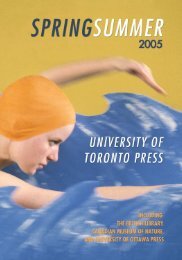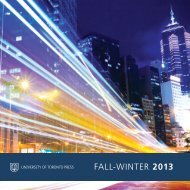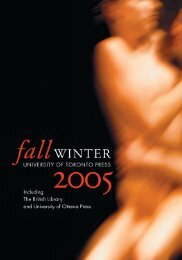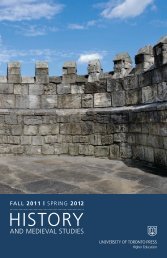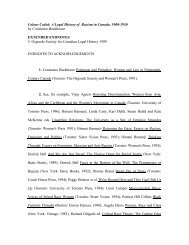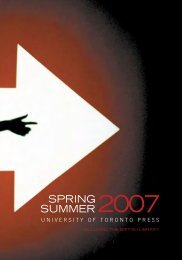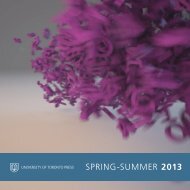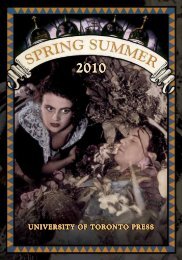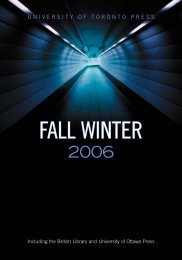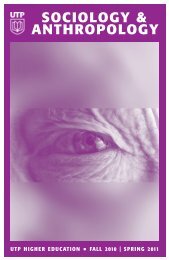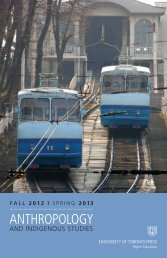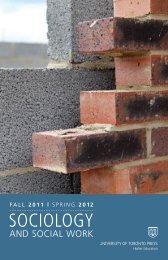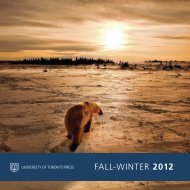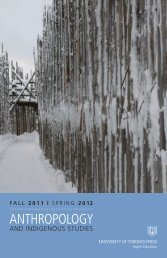Classics, Medieval & Renaissance 2012 - University of Toronto ...
Classics, Medieval & Renaissance 2012 - University of Toronto ...
Classics, Medieval & Renaissance 2012 - University of Toronto ...
Create successful ePaper yourself
Turn your PDF publications into a flip-book with our unique Google optimized e-Paper software.
HISTORY<br />
Cataloguing Discrepancies<br />
The Printed York Breviary <strong>of</strong> 1493<br />
NEW<br />
Andrew Hughes in collaboration with<br />
Matthew Cheung Salisbury and Heather Robbins<br />
Cataloguing Discrepancies reviews the description<br />
and cataloguing, from the early eighteenth century<br />
to the present day, <strong>of</strong> an early English Breviary,<br />
printed in 1493. With a critical eye, Andrew Hughes<br />
summarizes the work that has been done on this<br />
liturgical book.<br />
Based on the discrepancies and errors in the existing<br />
catalogues <strong>of</strong> medieval liturgical books, many <strong>of</strong><br />
which repeat erroneous information for generations,<br />
the authors illustrate the defects, problems, and<br />
opportunities encountered when technologies <strong>of</strong> the<br />
fifteenth and the twenty-first centuries converge.<br />
Andrew Hughes is <strong>University</strong> Pr<strong>of</strong>essor Emeritus in<br />
the Centre for <strong>Medieval</strong> Studies at the <strong>University</strong> <strong>of</strong><br />
<strong>Toronto</strong>.<br />
‘A remarkable work, covering an impressive range<br />
<strong>of</strong> scholarship old and new on the York Breviary.<br />
The authors set forth a new codicological ground<br />
for this liturgical book’s 1493 edition, with broad<br />
implications for the study <strong>of</strong> incunabula that are<br />
both exciting and pertinent.’<br />
Graeme M. Boone, The Ohio State <strong>University</strong><br />
244 pp / 46 illustrations / 6 x 9 / 2011<br />
Cloth 978-1-4426-4197-6 $55.00 (£38.99)<br />
A <strong>Renaissance</strong> Education<br />
Schooling in Bergamo 1500–1650<br />
Christopher Carlsmith<br />
Deeply rooted in archival sources, Christopher<br />
Carlsmith’s A <strong>Renaissance</strong> Education uses a case<br />
study approach to examine educational practices<br />
in the north-eastern Italian city <strong>of</strong> Bergamo from<br />
1500 to 1650.<br />
His close analysis <strong>of</strong> civic, ecclesiastical, confraternal,<br />
and family records not only paints a vivid portrait <strong>of</strong><br />
how schooling functioned in one city but also explores<br />
this small city’s dynamic interconnections with other<br />
locales and with larger regional processes.<br />
Christopher Carlsmith is an associate pr<strong>of</strong>essor<br />
in the Department <strong>of</strong> History at the <strong>University</strong> <strong>of</strong><br />
Massachusetts-Lowell.<br />
‘No scholar <strong>of</strong> <strong>Renaissance</strong> and Catholic Reformation<br />
education can afford to miss this important work.’<br />
Paul F. Grendler, Quaderni D’Italianistica<br />
416 pp / 10 illustrations / 6 x 9 / 2010<br />
Cloth 978-0-8020-9254-0 $75.00 (£52.99)<br />
The Matter <strong>of</strong> Mind<br />
Reason and Experience in the Age <strong>of</strong> Descartes<br />
NEW<br />
Christopher Braider<br />
What influence did René Descartes’ concept <strong>of</strong> mindbody<br />
dualism have on early modern conceptions<br />
<strong>of</strong> the self In The Matter <strong>of</strong> Mind, Christopher Braider<br />
challenges the presumed centrality <strong>of</strong> Descartes’<br />
groundbreaking theory to seventeenth-century<br />
French culture. He details the broad opposition to<br />
rational self-government among Descartes’ contemporaries,<br />
and attributes conventional links between<br />
Descartes and the myth <strong>of</strong> the ‘modern subject’ to<br />
post-structuralist assessments.<br />
Forceful and provocative, The Matter <strong>of</strong> Mind will<br />
encourage lively debate on the norms and discourses<br />
<strong>of</strong> seventeenth-century philosophy.<br />
Christopher Braider is a pr<strong>of</strong>essor in the Department<br />
<strong>of</strong> French and Italian at the <strong>University</strong> <strong>of</strong> Colorado at<br />
Boulder.<br />
‘The Matter <strong>of</strong> Mind will immediately become essential<br />
reading among specialists <strong>of</strong> French early modern<br />
literature and an important book for all those<br />
interested in early modern history, cognitive and<br />
aesthetic philosophy, and art history.’<br />
Larry Norman, <strong>University</strong> <strong>of</strong> Chicago<br />
Approx. 296 pp / 18 illustrations / 6 x 9 / January <strong>2012</strong><br />
Cloth 978-1-4426-4348-2 $75.00 (£48.00)<br />
utppublishing.com 19



